2016年新版译林英语五年级上册Unit7 At weekends单元测试卷
- 格式:doc
- 大小:865.00 KB
- 文档页数:5
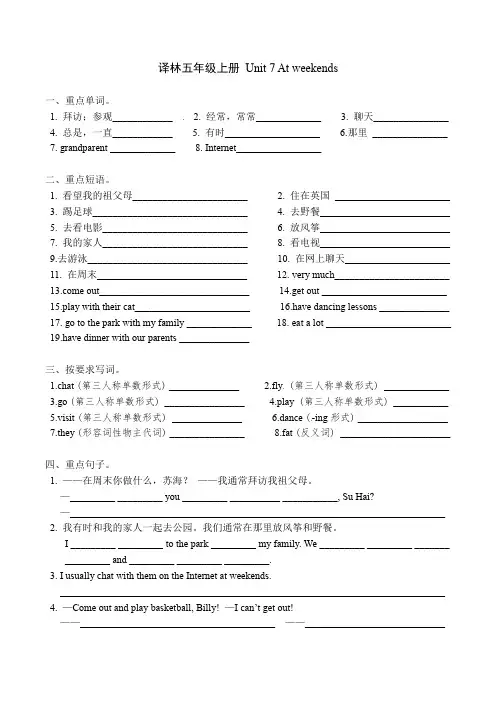
译林五年级上册Unit 7 At weekends一、重点单词。
1. 拜访;参观____________2. 经常,常常_____________3. 聊天_______________4. 总是,一直____________5. 有时___________________6.那里_______________7. grandparent _____________8. Internet_________________二、重点短语。
1. 看望我的祖父母_______________________2. 住在英国_______________________3. 踢足球_______________________________4. 去野餐__________________________5. 去看电影_____________________________6. 放风筝__________________________7. 我的家人_____________________________8. 看电视__________________________9.去游泳________________________________ 10. 在网上聊天_____________________ 11. 在周末______________________________ 12. very much_______________________ e out______________________________ 14.get out _________________________ 15.play with their cat_______________________ 16.have dancing lessons ______________ 17. go to the park with my family _____________ 18. eat a lot _________________________ 19.have dinner with our parents ______________三、按要求写词。
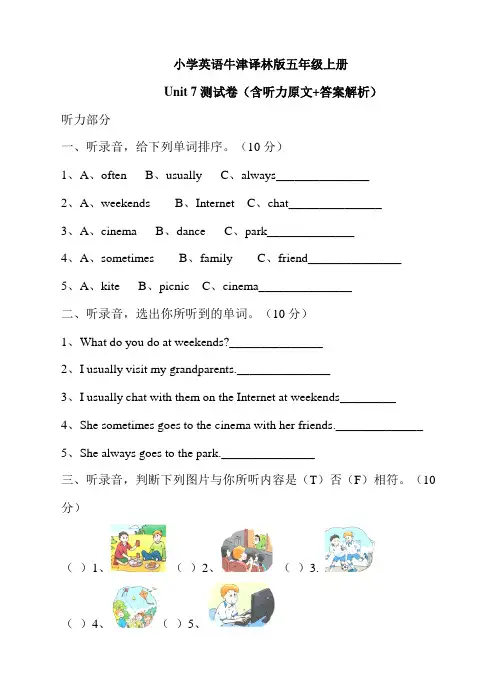
小学英语牛津译林版五年级上册Unit 7测试卷(含听力原文+答案解析)听力部分一、听录音,给下列单词排序。
(10分)1、A、often B、usually C、always_______________2、A、weekends B、Internet C、chat_______________3、A、cinema B、dance C、park______________4、A、sometimes B、family C、friend_______________5、A、kite B、picnic C、cinema_______________二、听录音,选出你所听到的单词。
(10分)1、What do you do at weekends?_______________2、I usually visit my grandparents._______________3、I usually chat with them on the Internet at weekends_________4、She sometimes goes to the cinema with her friends.______________5、She always goes to the park._______________三、听录音,判断下列图片与你所听内容是(T)否(F)相符。
(10分)()1、()2、()3.()4、()5、笔试部分一、按要求填入适当的词。
(10分)1、fly a kite(汉语)____2、去电影院(英语)_____3、sometimes (汉语)____4、go (三单)_____5、去野餐(英语)______6、at weekends(汉语)______7、fly(三单)______8、on the Internet(汉语)____9、和他聊天(英语)__________ 10、一堂舞蹈课(英语)__________二、单项选择(10分)()1、Peter often ____ emails to his friends.A、sendB、giveC、sends()2、My e-friend often chats with ____ on the Internet.A、IB、meC、we()3、Su Yang sometimes ___ in the park.A、flys kitesB、flies kitesC、flies kite()4、He often ____ with me.A、doing homeworkB、go homeC、watches cartoon ()5、I like ____ very much.A、drawB、singC、swimming()6、—Where ___ Nancy study?—She ___at the No.1 Primary School.A、does; studiesB、do; studiesC、does; study()7、Jim often ____ with his parents.A、goes swimmingB、going swimmingC、go swimming ()8、Yang Ling and I ____ going fishing at weekends.A、likeB、are likeC、likes()9、Miss Li teaches ___ English this term. We all like ___.A、us; sheB、us; herC、me; her()10、I always ___ at weekends.A、has dinnerB、have dancing lessonC、doing my homework三、根据句义提示,补全单词,完成句子。
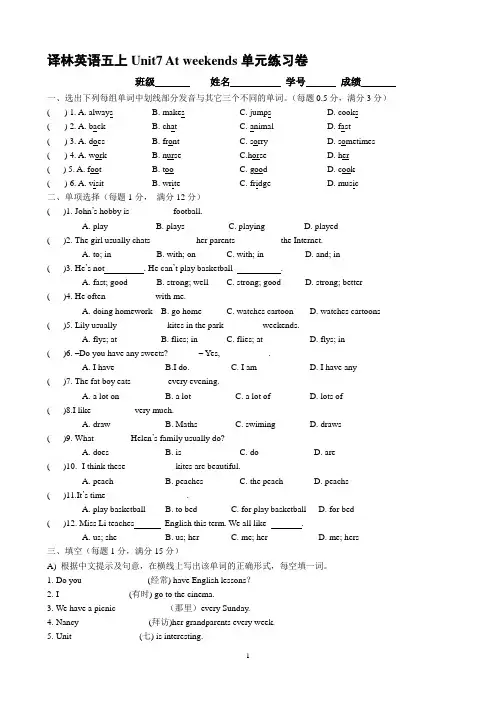
译林英语五上Unit7 At weekends单元练习卷班级姓名学号成绩一、选出下列每组单词中划线部分发音与其它三个不同的单词。
(每题0.5分,满分3分)( ) 1. A. always B. makes C. jumps D. cooks( ) 2. A. back B. chat C. animal D. fast( ) 3. A. does B. front C. sorry D. sometimes ( ) 4. A. work B. nurse C.horse D. her( ) 5. A. foot B. too C. good D. cook( ) 6. A. visit B. write C. fridge D. music二、单项选择(每题1分,满分12分)( )1. John’s hobby is _________ football.A. playB. playsC. playingD. played( )2. The girl usually chats __________her parents __________the Internet.A. to; inB. with; onC. with; inD. and; in( )3. He’s not . He can’t play basketball .A. fast; goodB. strong; wellC. strong; goodD. strong; better ( )4. He often ___________with me.A. doing homeworkB. go homeC. watches cartoonD. watches cartoons ( )5. Lily usually ___________kites in the park_________weekends.A. flys; atB. flies; inC. flies; atD. flys; in( )6. –Do you have any sweets? – Yes,___________.A. I haveB.I do.C. I amD. I have any( )7. The fat boy eats________ every evening.A. a lot onB. a lotC. a lot ofD. lots of( )8.I like _________ very much.A. drawB. MathsC. swimingD. draws( )9. What ________Helen’s family usually do?A. doesB. isC. doD. are( )10. I think these ___________kites are beautiful.A. peachB. peachesC. the peachD. peachs( )11.It’s time __________________.A. play basketballB. to bedC. for play basketballD. for bed( )12. Miss Li teaches English this term. We all like .A. us; sheB. us; herC. me; herD. me; hers三、填空(每题1分,满分15分)A) 根据中文提示及句意,在横线上写出该单词的正确形式,每空填一词。
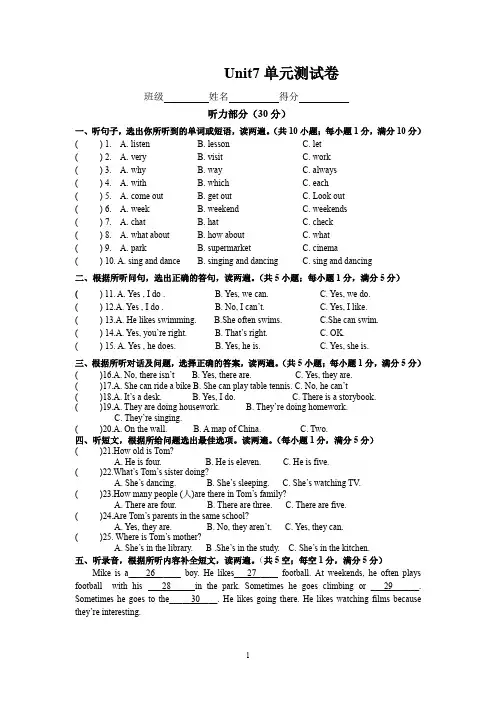
Unit7单元测试卷班级姓名得分听力部分(30分)一、听句子,选出你所听到的单词或短语,读两遍。
(共10小题;每小题1分,满分10分)( ) 1. A. listen B. lesson C. let( ) 2. A. very B. visit C. work( ) 3. A. why B. way C. always( ) 4. A. with B. which C. each( ) 5. A. come out B. get out C. Look out( ) 6. A. week B. weekend C. weekends( ) 7. A. chat B. hat C. check( ) 8. A. what about B. how about C. what( ) 9. A. park B. supermarket C. cinema( ) 10. A. sing and dance B. singing and dancing C. sing and dancing二、根据所听问句,选出正确的答句,读两遍。
(共5小题;每小题1分,满分5分)() 11. A. Yes , I do . B. Yes, we can. C. Yes, we do.( ) 12.A. Yes , I do . B. No, I can’t. C. Yes, I like.( ) 13.A. He likes swimming. B.She often swims. C.She can swim.( ) 14.A. Yes, you’re right. B. That’s right. C. OK.( ) 15. A. Yes , he does. B. Yes, he is. C. Yes, she is.三、根据所听对话及问题,选择正确的答案,读两遍。
(共5小题;每小题1分,满分5分)( )16.A.No, there isn’t B. Yes, there are. C. Yes, they are.( )17.A. She can ride a bike B. She can play table tennis. C. No, he can’t( )18.A. It’s a desk. B. Yes, I do. C. There is a storybook.( )19.A. They are doing housework. B. They’re doing homework.C. They’re singing.( )20.A. On the wall. B. A map of China. C. Two.四、听短文,根据所给问题选出最佳选项。
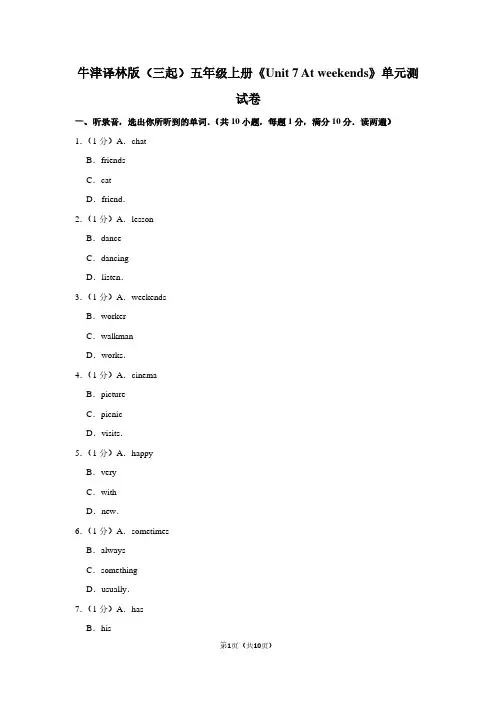
牛津译林版(三起)五年级上册《Unit 7 At weekends》单元测试卷一、听录音,选出你所听到的单词.(共10小题,每题1分,满分10分.读两遍)1.(1分)A.chatB.friendsC.catD.friend.2.(1分)A.lessonB.danceC.dancingD.listen.3.(1分)A.weekendsB.workerC.walkmanD.works.4.(1分)A.cinemaB.pictureC.picnicD.visits.5.(1分)A.happyB.veryC.withD.new.6.(1分)A.sometimesB.alwaysC.somethingD.usually.7.(1分)A.hasB.hisC.heD.her.8.(1分)A.roseB.oftenC.thereD.grow.9.(1分)A.goesB.doesC.fliesD.ice.10.(1分)A.come inB.come toC.come outD.come on.二、听录音,判断下列图片与所听内容是否相符,用“T”或“F”表示.(每小题5分,共5分读两遍)11.(5分)三、听短文,根据短文内容判断下列句子是否正确,用“T”或“F”表示.(共1小题,每题1分,满分5分.读两遍)12.(5分)1.It is summer now.2.Our class has a picnic in the park.3.The third group is drawing pictures.4.We are not having a good time.5.The leaves are very beautiful..四、听录音,填入所缺单词.(每空1分,共10分.读三遍)13.(4分)A:What your sister do at.B:She basketball.14.(4分)A:Mary kites?B:,she.一、选择.(每小题1分,共5分.)15.(1分)选出单词画线部分读音与其余不同的选项.()A.cinema B.pencil C.ice cream D.juice 16.(1分)选出单词画线部分读音与其余不同的选项.()A.fly B.like C.you D.why 17.(1分)选出单词画线部分读音与其余不同的选项.()A.come B.home C.glove D.sometimes 18.(1分)选出单词画线部分读音与其余不同的选项.()A.watch B.week C.who D.what 19.(1分)选出单词画线部分读音与其余不同的选项.()A.lake B.make C.chat D.cake二、英汉互译.(共1小题,每小题1分,满分1分)20.(1分)1.一堂舞蹈课2.go to the cinema3.拜访我的老师4.fly a kite5.和他聊天6.get out7.在网上8.too fat9.举行野餐10.eat a lot.三、单项选择.(共10小题,每题1分,满分10分)21.(1分)Peter often emails to his friends.()A.send B.give C.sends22.(1分)My e﹣friend often chats with on the Internet.()A.I B.me C.we23.(1分)Su Yang sometimes in the park.()A.flys kites B.flies kitesC.flies kite24.(1分)He often ___________with me.()A.doing homework B.go homeC.watches cartoon25.(1分)I like _________ very much.()A.draw B.Music C.swimming26.(1分)﹣Where ________ Nancy study?﹣She at the No.1Primary School.()A.does;studies B.do;studiesC.does;study27.(1分)﹣Does he go swimming every day?﹣Sometimes he ,sometimes he .()A.do;doesn't B.does;don'tC.does;doesn't28.(1分)Yang Ling and I going fishing at weekends.()A.like B.are like C.likes29.(1分)Miss Li teaches English this term.We all like .()A.us;she B.us;her C.me;her30.(1分)I always at weekends.()A.has dinner B.have dancing lessonC.doing my homework四、用所给词的正确形式填空.(共10个空格;每空一词,每词1分,满分11分)31.(3分)﹣﹣What(do)Su Yang usually do at weekends?﹣﹣She usually(fly)kites.32.(1分)My father often(have)dinner at home.33.(1分)Miss Li often chats with(I)after class.34.(3分)﹣﹣Mr Green(chat)on the Internet now?﹣﹣No,he.35.(1分)My sister(like)going shopping on Sundays.36.(2分)﹣﹣Where(do)Tom live?﹣﹣He(live)in London now.五、按要求完成下列句子.(共10个空格;每空一词,每词1分,满分5分)37.(2分)My grandparents often read books in the evening.(对划线部分提问)your grandparents often in the evening?38.(2分)He often has picnics with his friends.(改为一般疑问句).he often with his friends?39.(1分)I often go swimming after school.(用she 代替I 改写句子).after school.六、阅读理解(共3小题;每小题5分,满分15分)40.(5分)Weekends to people mean(意味着)that they can have two﹣day good rest.For example(例如),they can go out to visit their friends and relatives(亲戚).They can enjoy interesting CDs with their family.Everyone spends(度过)weekends in his own way.Within two days,some people listen to music,read books or watch films.Some people play basketball,swim or dance.I often spend my weekends with my friends.Sometimes I visit my friends,sometimes I go to the library to borrow(借)some books.I like reading.Outing(远足)is my favourite(最喜欢)way of spending weekends.Weekends are always enjoyable for me.1.People have one﹣day good rest at the weekends.2.Some people go to the cinema at the weekends.3.I often spend my weekends with my grandparents.4.Reading is my favourite way of spending weekends.5.Different (不同)people have different weekends..41.(5分)Hello,my name is Gao Shan.I am a student.I often do my homework on Friday evening.On Saturday morning,I usually read English.Then I go to the park with my parents.We usually fly kites and have a picnic there.On Sunday,my friend Mike comes to my home.I usually play table tennis with him.We all like to play table tennis.We have a good time.判断正(T)误(F)1.Gao Shan is a student.2.Gao Shan does his homework on Sunday morning..3.Gao Shan goes to the park with his friends.4.Gao Shan and his parents usually have a picnic in the park.5.Gao Shan and Mike like playing table tennis..42.(5分)At weekends,some people like to stay at home,some like to go out to play.My brother Leo works in a factory during(在…期间)the day.At weekends he always does the same thing.On Saturday he drives his car to a farm with our families.Our uncle and aunt have a large farm.We can do a lot of things there.My brother and my parents help to do farm work.I help to give food to their animals.At the end(结束)of the day,we all feel hungry.My uncle and aunt give us a big meal.We enjoy(享受)the weekend on their farm.1.Leo works.A.on a farmB.at a schoolC.in a factoryD.in an office2.My family go at weekends.A.to a farmB.to the beachC.to a factoryD.to a school3.My uncle is a.A.teacherB.studentC.workerD.farmer4.I on the farm.A.help to do farm workB.do my homeworkC.play footballD.feed(喂)the animals5.We go to the farm.A.on footB.by busC.by carD.by bike.七、根据首字母和短文内容填空(10分每空0.5分)43.(3分)There are f people in my family.They are my grandparents,my father,my mother and I.My grandparents l in the US.My father and mother usually d the housework every evening.I often h them.We always go to the supermarket on Sundays.Sometimes we go there by b.Sometimes we go by car.We all like w films.I love my family.44.(3分)A:W that man beside the car,Tim?B:He's my u,Michael.A:He's very t.Is he good at b?B:Yes,he can play it very w.A:What d he do?B:He's a p.He helps people.He stops thieves.A:That's cool.45.(3.5分)根据对话内容填空A:Hello,Helen.you have e﹣friends?B:Yes,I do.I have two e﹣friends.A:are they?B:They are twins,Lily and Lucy.A:do they?B:They live in a big city,London.A:Do you often send to them?B:Yes,I do.We often on the Internet too.牛津译林版(三起)五年级上册《Unit 7 At weekends》单元测试卷参考答案一、听录音,选出你所听到的单词.(共10小题,每题1分,满分10分.读两遍)1.;2.;3.;4.;5.;6.;7.;8.;9.;10.;二、听录音,判断下列图片与所听内容是否相符,用“T”或“F”表示.(每小题5分,共5分读两遍)11.;三、听短文,根据短文内容判断下列句子是否正确,用“T”或“F”表示.(共1小题,每题1分,满分5分.读两遍)12.略;略;略;略;略;四、听录音,填入所缺单词.(每空1分,共10分.读三遍)13.略;略;略;略;14.略;略;略;略;一、选择.(每小题1分,共5分.)15.C;16.C;17.B;18.C;19.C;二、英汉互译.(共1小题,每小题1分,满分1分)20.adance class;去电影院;visit my teacher;放风筝;talk to him;出来;出版;on the Internet;太胖;have a picnic;多吃;三、单项选择.(共10小题,每题1分,满分10分)21.C;22.B;23.B;24.C;25.C;26.A;27.C;28.A;29.B;30.B;四、用所给词的正确形式填空.(共10个空格;每空一词,每词1分,满分11分)31.does;flies;32.has;33.me;34.Is;chatting;isn't;35.likes;36.does;is living;五、按要求完成下列句子.(共10个空格;每空一词,每词1分,满分5分)37.What does;do;38.Does;have;picnics;39.She often goes swimming;六、阅读理解(共3小题;每小题5分,满分15分)40.错误;正确;错误;错误;正确;41.T;F;F;T;T;42.C;A;D;D;C;七、根据首字母和短文内容填空(10分每空0.5分)43.ive;ive;o;elp;us;atch;44.ho's;ncle;all;asketball;ell;oes;oliceman;45.Do;any;Who;Where;live;email;meet;。
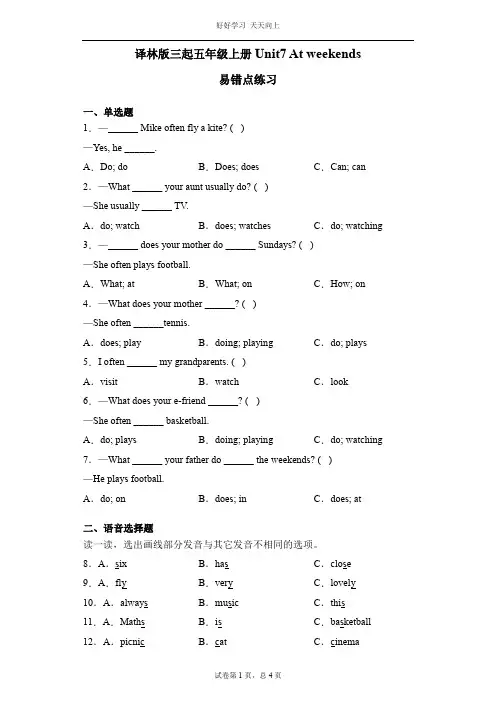
好好学习天天向上译林版三起五年级上册Unit7 At weekends易错点练习一、单选题1.—______ Mike often fly a kite? ( )—Yes, he ______.A.Do; do B.Does; does C.Can; can 2.—What ______ your aunt usually do? ( )—She usually ______ TV.A.do; watch B.does; watches C.do; watching 3.—______ does your mother do ______ Sundays? ( )—She often plays football.A.What; at B.What; on C.How; on 4.—What does your mother ______? ( )—She often ______tennis.A.does; play B.doing; playing C.do; plays 5.I often ______ my grandparents. ( )A.visit B.watch C.look 6.—What does your e-friend ______? ( )—She often ______ basketball.A.do; plays B.doing; playing C.do; watching 7.—What ______ your father do ______ the weekends? ( )—He plays football.A.do; on B.does; in C.does; at二、语音选择题读一读,选出画线部分发音与其它发音不相同的选项。
8.A.six B.has C.close 9.A.fly B.very C.lovely 10.A.always B.music C.this 11.A.Maths B.is C.basketball 12.A.picnic B.cat C.cinema13.A.always B.have C.chat三、情景选择14.He often ________ his aunt with his brother at weekends. ( ) A.visit B.visits C.visiting 15.—What about your weekends? ( )—I often watch TV. ________ I fly a kite with my sister.A.Some time B.Some times C.Sometimes 16.—What does Mike do at weekends? ( )—He often ________ with his friends ________ the Internet. A.chat; on B.chats; in C.chats; on四、词形转换按要求写单词17.China (形容词) ____________18.sit (现在分词) ____________19.chat (现在分词) ____________20.visit (第三人称单数) ____________21.dance (现在分词) ____________22.go (第三人称单数) ____________23.her (主格) _____________24.picnic (复数) __________25.uncle(对应词)__________26.writing (动词原形) _____________五、句子匹配选出相对应的答句。
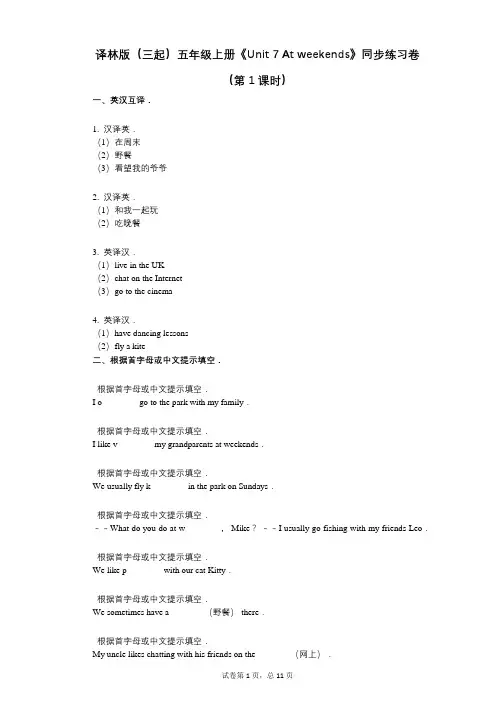
译林版(三起)五年级上册《Unit 7 At weekends》同步练习卷(第1课时)一、英汉互译.1. 汉译英.(1)在周末________(2)野餐________(3)看望我的爷爷________2. 汉译英.(1)和我一起玩________(2)吃晚餐________3. 英译汉.(1)live in the UK________(2)chat on the Internet________(3)go to the cinema________4. 英译汉.(1)have dancing lessons________(2)fly a kite________二、根据首字母或中文提示填空.根据首字母或中文提示填空.I o________ go to the park with my family.根据首字母或中文提示填空.I like v________ my grandparents at weekends.根据首字母或中文提示填空.We usually fly k________ in the park on Sundays.根据首字母或中文提示填空.﹣﹣What do you do at w________, Mike?﹣﹣I usually go fishing with my friends Leo.根据首字母或中文提示填空.We like p________ with our cat Kitty.根据首字母或中文提示填空.We sometimes have a________(野餐) there.根据首字母或中文提示填空.My uncle likes chatting with his friends on the________(网上).根据首字母或中文提示填空.﹣﹣Do you have swimming________(课程)?﹣﹣Yes, I do.三、单项选择.Wang Bing likes ________ with his e﹣friend Susan on the Internet.()A.chatB.chattingC.chatsWe often have dinner ________ our parents at weekends.()A.inB.onC.with﹣﹣What ________ Helen ________ at weekends?﹣﹣She always goes to the cinema with Lucy.()A.do; doB.does; doC.do; does﹣﹣What do you do at weekends, Lucy?﹣﹣I often go ________.()A.swimmingB.swimC.swimsLiu Tao always has ________ on Sundays.()A.dancing lessonB.dance lessonsC.dancing lessonsMy grandparents ________ the UK.() A.lives B.live in C.lives in四、按要求改写句子.按要求改写句子.I usually ________ at weekends.(对画线部分提问)________ you usually________ at weekends?按要求改写句子.My grandparents live ________.(对画线部分提问)________ your grandparents________?按要求改写句子.We play football with our classmates at weekends.(改为否定句)We________ football with our classmates at weekends.按要求改写句子.Jean sometimes goes to the cinema with her friends.(改为一般疑问句)________ Jean sometimes________ to the cinema with her friends?按要求改写句子.My brother likes flying a kite in the park on Saturdays.(改为否定句)My brother________ a kite in the park on Saturdays.五、根据所给情境,补全对话.根据所给情境,补全对话.A:What (1)________ you(2)________ at weekends, Mike?B:I usually (3)________ my grandparents. I like playing(4)________ their cat Kitty. That's funny.A:Oh, my grandparents (5)________ in the UK. I usually(6)________ with them on the (7)________at weekends.B:I think that's great.A:What (8)________ Lucy (9)________ at weekends?B:She always has singing (10)________ at weekends. And she sometimes has a picnic (11)________her friends.六、从II栏中选出与I栏相对应的答句.从II栏中选出与I栏相对应的答句.A.Yes, I do.2.Do you often play basketball at weekends? AB.He lives in the countryside.3.Who's your e﹣friend, Su Yang? EC.She often chats with her e﹣friend Su Hai on the Internet.4.Where does your grandpa live? BD.I usually go to the cinema with my family.5.What does Nancy do at weekends? CE.Lily.参考答案与试题解析译林版(三起)五年级上册《Unit 7 At weekends》同步练习卷(第1课时)一、英汉互译.1.【答案】on the weekend,picnic,visit my grandfather【考点】翻译能力单词、词组【解析】(1)on the weekends(2)picnic(3)visit my grandfather【解答】本题考查短语翻译和单词翻译.(1)on the weekend.在周末on the weekend.故答案为:on the weekend.(2)picnic.野餐picnic.故答案为:picnic.(3)visit my grandfather.看望我的爷爷visit my grandfather.故答案为:visit my grandfather.2.【答案】play with me,have dinner【考点】翻译能力【解析】(1)play with me.(2)have dinner.【解答】本题考查短语翻译.(1)play with me.和我一起玩play with me.介词后用代词的宾格me.故答案为:play with me.(2)have dinner.吃晚餐have dinner.故答案为:have dinner.3.【答案】住在英国,在网上聊天,去电影院【考点】翻译能力【解析】(1)住在英国.(2)在网上聊天.(3)去电影院.【解答】本题考查短语翻译.(1)住在英国.live in the UK住在英国.故答案为:住在英国.(2)在网上聊天.chat on the Internet在网上聊天.故答案为:在网上聊天.(3)去电影院.go to the cinema去电影院.故答案为:去电影院.4.【答案】上舞蹈课,放风筝【考点】翻译能力【解析】(1)上舞蹈课(2)放风筝【解答】本题考查短语翻译.(1)上舞蹈课.have dancing lessons上舞蹈课.故答案为:上舞蹈课.(2)放风筝.fly a kite放风筝.故答案为:放风筝.二、根据首字母或中文提示填空.【答案】ften【考点】单词、词组【解析】我经常和家人一起去公园.【解答】考查单词填空.根据题干:这里表示经常,以o开头应该是often.故答案为:often.【答案】isiting【考点】单词、词组【解析】我喜欢周末去看望我的祖父母.【解答】考查单词填空.根据题干:从my grandparents at weekends,判断首字母以v开头应该是visit,like doing sth表示喜欢做某事.故答案为:visiting.【答案】ites【考点】单词、词组【解析】星期天我们通常在公园放风筝.【解答】考查单词填空.根据题干:这里表示放风筝,以k开头应该是kite,名词,风筝,应该用复数形式.故答案为:kites.【答案】eekends【考点】单词、词组【解析】﹣﹣你周末做什么,迈克?﹣﹣我通常和我的朋友利奥去钓鱼.【解答】考查单词填空.根据题干:从I usually go fishing with my friends Leo,以w开头应该是weekend,名词,周末,at weekends表示在周末.故答案为:weekends.【答案】laying【考点】单词、词组【解析】我们喜欢和小猫玩.【解答】考查单词填空.根据题干:like doing sth表示喜欢做某事,以p开头应该是play,play with表示与…玩耍.故答案为:playing.【答案】picnic【考点】翻译能力【解析】我们有时在那里野餐.【解答】考查翻译填空.题中,野餐翻译成picnic,放在a后面跟名词单数形式picnic.故答案为:picnic.【答案】Internet【考点】翻译能力【解析】我叔叔喜欢和他的朋友在网上聊天.【解答】考查翻译填空."网络"翻译成Internet,on the Internet表示在网上,固定搭配.故答案为:Internet.【答案】lessons【考点】【解析】﹣﹣你上游泳课吗?﹣﹣是的,上.【解答】考查翻译填空.题中,课程翻译成lesson,swimming lessons表示游泳课,这里用复数形式.故答案为:lessons.三、单项选择.【答案】B【考点】动名词【解析】王兵喜欢在网上和他的网友Susan聊天.【解答】考查动名词.由题,句中使用like表示喜欢做某事,其后搭配的动词要用动名词形式,chat的动名词形式为chatting.故选:B.【答案】C【考点】介词【解析】在周末我们经常和我们的父母吃晚饭.【解答】考查介词的辨析.由题,A、B为时间或位置介词,C为"和……一起",C选项代入句意为"在周末我们经常和我们的父母吃晚饭."符合逻辑.故选:C.【答案】B【考点】特殊疑问句【解析】﹣﹣在周末Helen做什么?﹣﹣她总是和Lucy去电影院.【解答】考查特殊疑问句.由题,问句主语Helen为第三人称单数,疑问词what后的助动词要用第三人称单数形式does,助动词后的实义动词要用原形形式,即do.故选:B.【答案】A【考点】动名词【解析】﹣﹣Lucy,你周末做什么?﹣﹣我经常去游泳.考查动名词.由题,问句在询问Lucy在周末常做什么,答句表示"去游泳"要固定搭配go swimming.故选:A.【答案】C【考点】动词短语【解析】刘涛星期天总是上舞蹈课.【解答】考查短语.上…课是have…class,舞蹈课,即dancing class,由always,可知舞蹈课不止一节,为复数形式.故选:C.【答案】B【考点】动词短语动词原形【解析】我的祖父母住在英国.【解答】考查动词短语、动词原形.由题,句中主语grandparents为复数形式,其后可以搭配动词的原形而不能搭配第三人称单数形式,故A、C选项不符;表示"在英国"要搭配介词in.故选:B.四、按要求改写句子.【答案】chat with my friends on the Internet,What do,do【考点】就划线部分提问【解析】我周末通常和朋友在网上聊天.你周末通常做什么?【解答】考查特殊疑问句.特殊疑问句的结构:特殊疑问词+一般疑问句.句子的划线部分是chat with my friends on the Internet,是做事情,询问什么,确定疑问词为What,句子的剩余部分变成一般疑问句跟在后面,句子中有谓语动词原形chat,变一般疑问句用助动词do引导,I变为you.用What do you usually do at weekends?提问.故答案为:What do,do.【答案】in the US,Where do,live【考点】就划线部分提问我的祖父母住在美国.你的祖父母住在哪里?【解答】考查特殊疑问句.特殊疑问句的结构:特殊疑问词+一般疑问句.句子的划线部分是in the US,是地点,询问在哪,确定疑问词为Where,句子的剩余部分变成一般疑问句跟在后面,句子中有谓语动词原形live,变一般疑问句用助动词do引导,My变为your.用Where do your grandparents live?提问.故答案为:Where do,live.【答案】don't play【考点】肯定句转否定句【解析】我们周末和同学一起踢足球.我们周末不和同学一起踢足球.【解答】考查肯定句转否定句.原句是一般现在时的陈述句,句子中有谓语动词原形play,变否定句用助动词do,其后加not即可,do not可缩写为don't,放于主语后,动词原形前,其余部分顺序不变.原句变为的否定句为:We don't play football with our classmates at weekends.故答案为:don't play.【答案】Does,go【考点】一般疑问句【解析】简有时和她的朋友一起去看电影.简有时和她的朋友一起去看电影吗?【解答】考查一般疑问句.原句是一般现在时的陈述句,句子中有谓语动词的第三人称单数goes,变一般疑问句用助动词Does引导,放于句首,其余部分按顺序放在Does后,goes变为go,句末加问号.原句变为的一般疑问句就是:Does Jean sometimes go to the cinema with her friends?故答案为:Does,go.【答案】doesn't like flying【考点】肯定句转否定句【解析】我弟弟喜欢周六在公园里放风筝.我弟弟不喜欢周六在公园里放风筝.【解答】考查肯定句转否定句.原句是一般现在时的陈述句,句子中谓语动词是第三人称单数likes,变否定句用助动词does,其后加not即可,does not可缩写为doesn't,放于主语后,动词原形前,likes还原为like,其余部分顺序不变.原句变为的否定句为:My brother doesn't like flying a kite in the park on Saturdays.故答案为:doesn't like flying.五、根据所给情境,补全对话.【答案】do,do,visit,with,live,chat,Internet,does,do,lessons,with【考点】补全对话【解析】A:迈克,你在周末做什么?B:我通常拜访我的祖父母.我喜欢和他们的猫凯蒂玩.很有趣.A:哦,我的爷爷奶奶住在英国.我通常在周末在网上和他们聊天.B:我认为那很不错.A:露西在周末做什么呢?B:她总是在周末上声乐课.有时候她会和她的朋友们进行一次野餐.【解答】考查补全对话.(1)do.考查助动词.对话用一般现在时,主语是you第二人称,句中有实意动词,助动词用do.故填:do.(2)do.考查动词.助动词do后面跟动词原形do"做",询问做什么.故填:do.(3)visit.考查动词.由题,I是第一人称单数,谓语动词用原形,visit拜访,符合题意.故填:visit.(4)with.考查介词.play with是固定搭配,译为:与…一起玩耍,符合题意.故填:with.(5)live.考查动词.in the UK在英国,根据后文可知,会与爷爷奶奶在晚上聊天,所以,他们应该住在英国,主语是复数,谓语动词用原形live.故填:live.(6)chat.考查动词.chat with them与他们聊天,符合题意语境.主语是I,谓语动词用原形chat.故填:chat.(7)Internet.考查名词.on the Internet在网上,固定搭配,符合题意语境.故填:Internet.(8)does.考查助动词.主语是第三人称单数,句中有实意动词,助动词用does.故填:does.(9)do.考查动词.助动词does后面跟动词原形do"做",询问Lucy做什么.故填:do.(10)lessons.考查名词复数.singing lessons声乐课,这里用复数表示一类.故填:lessons.(11)with.考查介词.with与…一起,后面常跟人,用在这里符合题意.故填:with.六、从II栏中选出与I栏相对应的答句.【答案】D【考点】固定搭配【解析】1.苏海,你在周末做什么?我经常和我的朋友去电影院.2.你经常在周末打篮球吗?是的,我经常打.3.苏阳,你的网友是谁?Lily.4.你的爷爷住在哪里?他住在乡下.5.Nancy在周末做什么?她经常和她的网友苏海在网上聊天.【解答】1.D.考查特殊疑问句.问句意思为:苏海,你在周末做什么?答语回答苏阳做的事情.D选项意思为:我经常和我的朋友去电影院.符合句意.故选:D.2.A.考查一般疑问句.问句意思为:你经常在周末打篮球吗?用yes或者no作答.A选项意思为:是的,我经常打.符合句意.故选:A.3.E.考查特殊疑问句.问句意思为:苏阳,你的网友是谁?who提问人物.答语回答人物.E选项回答了人名Lily.符合句意.故选:E.4.B.考查特殊疑问句.问句意思为:你的爷爷住在哪里?where提问地址,答语回答地址.B选项意思为:他住在乡下.符合句意.故选:B.5.C.考查特殊疑问句.问句意思为:Nancy在周末做什么?答语回答做的事情.C 选项意思为:她经常和她的网友苏海在网上聊天.符合句意.故选:C.试卷第11页,总11页。
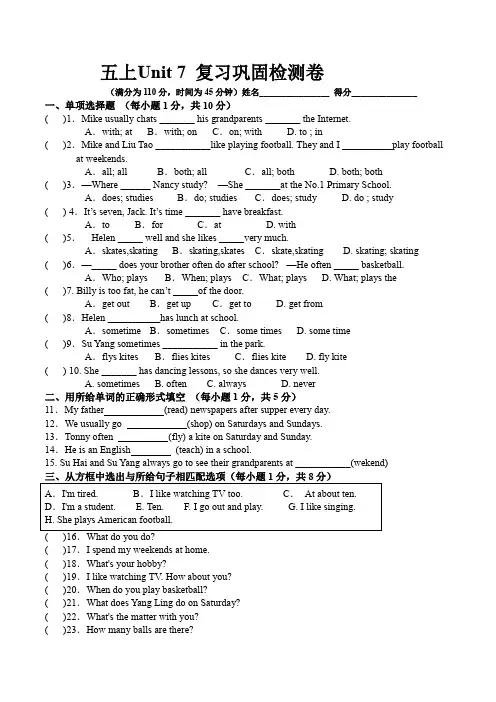
五上Unit 7 复习巩固检测卷(满分为110分,时间为45分钟)姓名________________ 得分_______________一、单项选择题(每小题1分,共10分)( )1.Mike usually chats _______ his grandparents _______ the Internet.A.with; at B.with; on C.on; with D. to ; in( )2.Mike and Liu Tao ___________like playing football. They and I __________play football at weekends.A.all; all B.both; all C.all; both D. both; both( )3.—Where ______ Nancy study?—She _______at the No.1 Primary School.A.does; studies B.do; studies C.does; study D. do ; study( ) 4.It’s seven, Jack. It’s time _______ have breakfast.A.to B.for C.at D. with( )5.Helen _____ well and she likes _____very much.A.skates,skating B.skating,skates C.skate,skating D. skating; skating ( )6.—_____ does your brother often do after school? —He often _____ basketball.A.Who; plays B.When; plays C.What; plays D. What; plays the( )7. Billy is too fat, he can’t _____of the door.A.get out B.get up C.get to D. get from( )8.Helen _____ _____has lunch at school.A.sometime B.sometimes C.some times D. some time( )9.Su Yang sometimes ___________ in the park.A.flys kites B.flies kites C.flies kite D. fly kite( ) 10. She _______ has dancing lessons, so she dances very well.A. sometimesB. oftenC. alwaysD. never二、用所给单词的正确形式填空(每小题1分,共5分)11.My father (read) newspapers after supper every day.12.We usually go (shop) on Saturdays and Sundays.13.Tonny often (fly) a kite on Saturday and Sunday.14.He is an English (teach) in a school.15. Su Hai and Su Yang always go to see their grandparents at ___________(wekend)( )17.I spend my weekends at home.( )18.What's your hobby?( )19.I like watching TV. How about you?( )20.When do you play basketball?( )21.What does Yang Ling do on Saturday?( )22.What's the matter with you?( )23.How many balls are there?四.用16数字将下列句子排成正确顺序,最后一句已给出(每个数字1分,共5分)( ) Great! Let’s go and have a picnic now.( ) How about autumn?( ) What do you usually do in spring, Su Hai?( ) Sorry. I can’t go out. I have to do my homework first.( ) I usually fly a kite with my sister Su Yang.( )I sometimes have a picnic with my family.24.( ) ( ) ( ) ( ) ( ) ( 4 )五、连词成句(每小题2分,共10分)25.has, a, picnic, Mike, in, park, sometimes, the (.)______________________________________________________________ 26.what, he, do, does, the, at, weekend (?)_______________________________________________________________ 27.you, usually, chat, do, on, the, Internet (?)_______________________________________________________________28.I, like, cat, playing, with, their, very, much (.)______________________________________________________________ 29.do, you, on, weekend, the, what, do (?)_______________________________________________________________六.汉译英,每空一词(每个词1分,共18分)30.我通常在周末和他们在网上聊天。
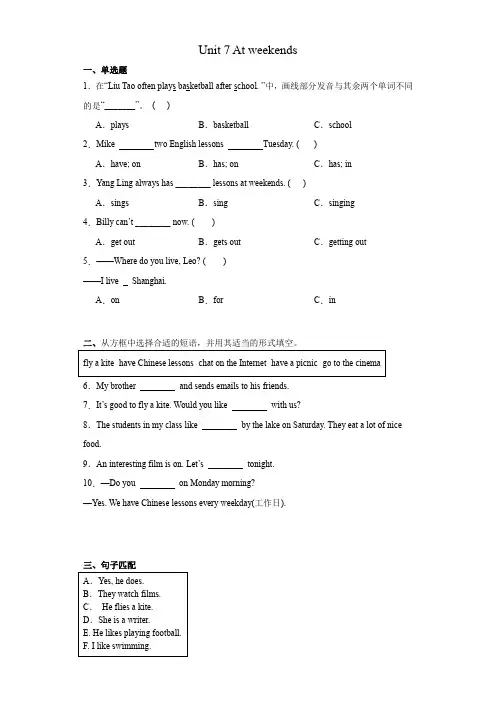
Unit 7 At weekends一、单选题1.在“Liu Tao often plays basketball after school. ”中,画线部分发音与其余两个单词不同的是“_______”。
( )A.plays B.basketball C.school2.Mike two English lessons Tuesday. ()A.have; on B.has; on C.has; in3.Yang Ling always has ________ lessons at weekends. ()A.sings B.sing C.singing4.Billy can’t ________ now. ()A.get out B.gets out C.getting out 5.——Where do you live, Leo? ()——I live Shanghai.A.on B.for C.in二、从方框中选择合适的短语,并用其适当的形式填空。
fly a kite have Chinese lessons chat on the Internet have a picnic go to the cinema6.My brother and sends emails to his friends.7.It’s good to fly a kite. Would you like with us?8.The students in my class like by the lake on Saturday. They eat a lot of nice food.9.An interesting film is on. Let’s tonight.10.—Do you on Monday morning?—Yes. We have Chinese lessons every weekday(工作日).A.Yes, he does.B.They watch films.C.He flies a kite.D.She is a writer.E. He likes playing football.F. I like swimming.G. OK.H. She often swims.I. No, I don’ t.J. No, they don’t.11.Do you like sports? ( )12.What does your sister do at her weekends? ( )13.Do your parents go to the zoo with you? ( )14.Shall we sing and dance now? ( )15.What is your hobby? ( )16.What do your parents do at weekends? ( )17.What does his father do at weekends? ( )18.What does he like doing? ( )19.What does she do? ( )20.Does he have any flowers? ( )四、选内容补全对话/短文Han Mei: What do you do at weekends, Liu Ying?Liu Ying: I have a skating lesson on Saturday.Han Mei: That's cool! 21Liu Ying: They sometimes go to the cinema.Han Mei: 22Liu Ying: He's a policeman. He is very busy.Han Mei: Wow! How great! 23Liu Ying: Yes, sometimes he does. Usually, my mother does some cooking. Han mei: 24Liu Ying: Of course. She is good at cooking.A.Is she a good cook?B.What about your parents?C.What does your father do?D.Does he cook food for you?五、改写句子25.My mother always watches TV after dinner. (改为否定句)My mother TV after dinner.26.We usually fly a kite there. (用he替换we改写句子)usually a kite there.27.My friend goes to the cinema with me at weekends. (改为否定句)My friend to the cinema with me at weekends.28.Please give me some flowers. (改否定句)Please give me flowers.29.She does her homework in the evening. (改否定句)She her homework in the evening.六、连词成句30.goes, cinema, at, sometimes, to, Bill, the, weekends (.)31.sometimes, go, their, Sundays, parents, to, they, with, on, zoo, the (.)32.doesn’t, watching TV, Mike, at home, like (.)33.go, their, Sundays, parents, to, they, with, on, zoo, the (.)34.has, a, picnic, Mike, in, park, sometimes, the (.)七、阅读选择Happy FarmCome with your family for a fine day or weekend. Pet and feed(喂养) the animals, ride or walk on the farm. You can also use(使用) our game room and the swimming pool. You can swim there. You will be not hungry. We have three meals here.Open: Weekdays 8:00 am to 8:00 pm and all weekends.¥50 yuan /each person(人)Closed: Tuesdays.Address: 128 Robert Road.Tel: 010-*******35.On the farm, we can ______. ()A.feed animals B.pick apples C.water flowers 36.We can go to the farm on ______. ()A.Tuesday B.Monday C.every day 37.The farm opens ______ days a week. ()A.seven B.six C.five 38.“swimming pool” means ______. ()A.草地B.马厩C.游泳池39.Tom and his parents want to go to the farm. They need to pay(付费) ______. () A.100 yuan B.50 yuan C.150 yuan。
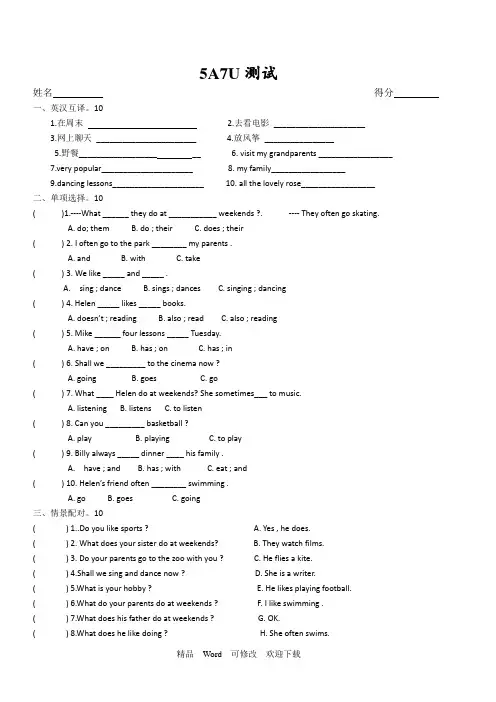
5A7U测试姓名得分一、英汉互译。
101.在周末2.去看电影_____________________3.网上聊天_______________________4.放风筝________________5.野餐__________________ __6. visit my grandparents _________________7.very popular_____________________ 8. my family_________________9.dancing lessons_____________________ 10. all the lovely rose_________________二、单项选择。
10( )1.----What ______ they do at ___________ weekends ?. ---- They often go skating.A. do; themB. do ; theirC. does ; their( ) 2. I often go to the park ________ my parents .A. andB. withC. take( ) 3. We like _____ and _____ .A. sing ; danceB. sings ; dancesC. singing ; dancing( ) 4. Helen _____ likes _____ books.A. doesn’t ; readingB. also ; readC. also ; reading( ) 5. Mike ______ four lessons _____ Tuesday.A. have ; onB. has ; onC. has ; in( ) 6. Shall we _________ to the cinema now ?A. goingB. goesC. go( ) 7. What ____ Helen do at weekends? She sometimes___ to music.A. listeningB. listensC. to listen( ) 8. Can you _________ basketball ?A. playB. playingC. to play( ) 9. Billy always _____ dinner ____ his family .A. have ; andB. has ; withC. eat ; and( ) 10. Helen’s friend often ________ swimming .A. goB. goesC. going三、情景配对。
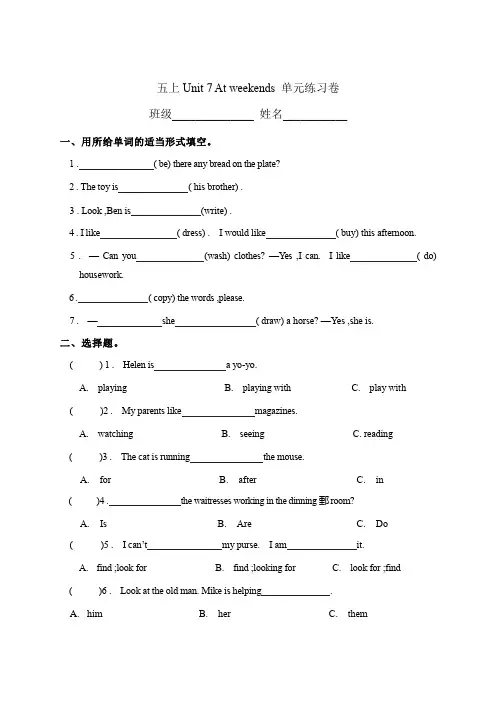
五上Unit 7 At weekends 单元练习卷班级______________ 姓名___________一、用所给单词的适当形式填空。
1 . ( be) there any bread on the plate?2 . The toy is ( his brother) .3 . Look ,Ben is (write) .4 . I like ( dress) . I would like ( buy) this afternoon.5 . — Can you (wash) clothes? —Y es ,I can. I like ( do)housework.6 . ( copy) the words ,please.7 . — she ( draw) a horse? —Yes ,she is.二、选择题。
( ) 1 . Helen is a yo-yo.A. playingB. playing withC. play with ( )2 . My parents like magazines.A. watchingB. seeingC. reading( )3 . The cat is running the mouse.A. forB. afterC. in( )4 . the waitresses working in the dinning鄄room?A. IsB. AreC. Do( )5 . I can’t my purse. I am it.A. find ;look forB. find ;looking forC. look for ;find( )6 . Look at the old man. Mike is helping .A.himB. herC. them( )7 . your uncle a model plane?A. Is ;makingB. Are ;makingC. Is ;make( )8 . It is nine o’clock Saturday morning.A.onB. inC. /( )9 . Let’s go . There are some lovely birds the tree.A. to there;inB. there;inC. there ;on( ) 10 . We often play school.A. the football afterB. football behindC. football after三、从右栏中找出相对应的答句。
译林版(三起)五年级上册《Unit 7 At weekends》同步练习卷(第3课时)一、英汉互译.1. 英汉互译.(1)看电视________(2)喜欢野餐________(3)夏天到了________2. 英汉互译.(1)吃很多的食物________(2)打篮球________(3)come out________3. 英汉互译.(1)go swimming________(2)have a picnic________4. 英汉互译.(1)too fat________(2)can't get out________二、按要求写词.按要求写词.(1)flies(原形)________(2)watch(第三人称单数)________按要求写词.(1)picnic(复数)________(2)come(第三人称单数)________按要求写词.(1)swimming(原形)________(2)eat(第三人称单数)________按要求写词.(1)fat(反义词)________(2)come out(近义词)________三、根据首字母或中文提示填空.根据首字母或中文提示填空.We all like________(夏天). Because we can swim in the river.根据首字母或中文提示填空.Let's go and have a________(野餐), Mike.根据首字母或中文提示填空.Leo is too________(胖的). He can't eat snacks at all.根据首字母或中文提示填空.Mike and I often play b________ at weekends.根据首字母或中文提示填空.My grandparents like w________ TV.根据首字母或中文提示填空.Lucy often c________ with her friends on the Internet.根据首字母或中文提示填空.C________ out and play basketball, Billy!四、单项选择.Su Hai usually ________ kites in the park ________ weekends.()A.fly; at B.flies; in C.flies; atWe sometimes go to the park ________ our family on Sundays.()A.and B.with C.forShe is ________ fat. She must eat a lot of snacks.()A.tooB.withC.inIn ________, people like going swimming.()A.summerB.winterC.autumnBilly is too fat. He can't get ________ the door.()A.ofB.atC.out ofI like ________ on the swings, but my brother ________.()A.playing; don't B.playing; doesn'tC.play; don't五、用所给词的适当形式填空.用所给词的适当形式填空.He is too fat. He can't________(get) out of the door.用所给词的适当形式填空.My little brother usually________(watch) TV at weekends.用所给词的适当形式填空.Billy doesn't like________(swim).用所给词的适当形式填空.Winter________(come). We can go skating.用所给词的适当形式填空.She________(like)________(fly) kites in the park.用所给词的适当形式填空.My sister likes________(play) the piano.用所给词的适当形式填空.﹣﹣Let's________(have) a picnic in the park.﹣﹣That's great.用所给词的适当形式填空.Mike________(read) English every day.六、将下列句子排列成一段通顺的对话.将下列句子排列成一段通顺的对话.(1 )Hello, Sam.________Let's go swimming.( 5 )Let's go and make a salad.________Hello, Bobby.________Oh, wait for me.________What's the matter?________Great! I like eating.________No, I don't like swimming.________I can't come out. I'm too fat.参考答案与试题解析译林版(三起)五年级上册《Unit 7 At weekends》同步练习卷(第3课时)一、英汉互译.1.【答案】watch TV,like to have a picnic,summer is coming【考点】翻译能力【解析】(1)看电视watch TV.(2)喜欢野餐like to have a picnic.(3)夏天到了summer is coming.【解答】该题考查短语翻译.(1)watch TV.看电视watch TV.故答案为:watch TV.(2)like to have a picnic.喜欢野餐like to have a picnic.故答案为:like to have a picnic.(3)summer is coming.夏天到了summer is coming.故答案为:summer is coming.2.【答案】eat lots of food,play baseketball,出来【考点】翻译能力【解析】(1)吃很多的食物eat lots of food(2)打篮球play baseketball.(3)come out出来.【解答】该题考查短语翻译.(1)eat lots of food.吃很多的食物eat lots of food.故答案为:like cats.(2)play baseketball.打篮球译为:play baseketball.故答案为:play baseketball.(3)出来.come out出来,故答案为:出来.3.【答案】去游泳,去野餐【考点】翻译能力【解析】(1)go swimming去游泳.(2)have a picnic去野餐.该题考查短语翻译.(1)去游泳.go swimming去游泳.故答案为:去游泳.(2)去野餐,have a picnic去野餐,故答案为:去野餐.4.【答案】太胖,出不去【考点】翻译能力【解析】(1)too fat太胖.(2)can't get out出不去【解答】该题考查短语翻译.(1)太胖,too fat太胖,故答案为:太胖.(2)出不去.can't get out出不去.故答案为:出不去.二、按要求写词.【答案】fly,watches【考点】动词原形一般现在时,动词单数第三人称【解析】(1)飞(2)观看【解答】(1)fly.考查动词原形.flies的原形是fly.故答案为:fly.(2)watches.考查动词的第三人称单数.watch的第三人称单数是watches.故答案为:watches.【答案】picnics,comes【考点】一般现在时,动词单数第三人称可数名词及其单复数【解析】(1)野炊(2)来【解答】(1)picnics.考查可数名词及其单复数.picnic的原形是picnic.故答案为:picnics.(2)comes.考查动词的第三人称单数.come的第三人称单数是comes.故答案为:comes.【答案】swim,eats【考点】一般现在时,动词单数第三人称【解析】(1)游泳(2)吃【解答】(1)swim.考查动词原形.swimming的原形是swim.故答案为:swim.(2)eats.考查动词的第三人称单数.eat的第三人称单数是eats.故答案为:eats.【答案】thin,get out【考点】反义词、对应词同义词【解析】(1)胖(2)出来【解答】(1)thin.考查反义词.fat胖,反义词是thin瘦.故答案为:thin.(2)get out.考查近义词.come out出来,近义词是get out出来.故答案为:get out.三、根据首字母或中文提示填空.【答案】summer【考点】翻译能力【解析】我们都喜欢夏天.因为我们可以在河里游泳.【解答】本题考查翻译填空."夏天"译为"summer".题干句意"我们都喜欢夏天.因为我们可以在河里游泳.", like是动词,后面直接跟名词summer作宾语.故答案为:summer.【答案】picnic【考点】翻译能力【解析】迈克,让我们去野餐吧.【解答】本题考查翻译填空."野餐"译为"picnic".题干句意"迈克,让我们去野餐吧.", havea picnic野餐,是固定短语.故答案为:picnic.【答案】fat【考点】翻译能力Leo太胖了.他一点也不能吃小吃了.【解答】本题考查翻译填空."胖的"译为"fat".题干句意"Leo太胖了.他一点也不能吃小吃了.",is系动词,后跟形容词作表语,too副词,直接修饰形容词原级fat.故答案为:fat.【答案】asketball【考点】单词、词组【解析】迈克和我经常在周末打篮球.【解答】考查单词填空.根据题干:句子考查play basketball表示打篮球.故答案为:basketball.【答案】atching【考点】单词、词组【解析】我祖父母喜欢看电视.【解答】考查单词填空.根据题干:句子中考查watch TV表示看电视,放在like后面跟动名词形式.故答案为:watching.【答案】hats【考点】单词、词组【解析】Lucy经常在网上和她的朋友们聊天.【解答】本题主要考查单词填空.句子大意为:Lucy经常在网上和她的朋友们_____.单词的首字母为c,推测单词为chat,意思为:聊天,题干可知句子是一般现在时,Lucy是第三人称单数形式,其后的动词用第三人称单数形式chats.故填:chats.【答案】ome【考点】单词、词组【解析】出来打篮球,比利!【解答】考查单词填空.根据题干:句子中come out表示出来.四、单项选择.【答案】C【考点】一般现在时,动词单数第三人称介词【解析】苏海通常周末在公园里放风筝.【解答】考查动词的第三人称单数、时间介词.由题,usually"通常"表明句子使用一般现在时,且主语Su Hai为第三人称单数形式,其后要搭配动词的第三人称单数形式,fly的第三人称单数形式为flies;"在周末"可以使用固定搭配at weekends或on weekends.C选项符合.故选:C.【答案】B【考点】连词【解析】星期天我们有时和家人一起去公园.【解答】该题考查连词辨析.and和,连词;with和,介词;for为了;句意:星期天我们有时和家人一起去公园,用介词with.故选:B.【答案】A【考点】副词【解析】她太胖了.她肯定吃很多小吃.【解答】考查副词的用法.由题,A表示"太"可以修饰形容词fat,表示"太胖",句意为"她太胖了.她肯定吃很多小吃."符合逻辑.B"和……一起"、C"在……里"均为介词,不可用于修饰形容词.故选:A.【答案】A【考点】季节与天气【解析】在夏天,人们喜欢去游泳.【解答】考查季节与天气.由题,按照逻辑句子在描述人们喜欢去游泳的季节,A为"夏天",B 为"冬天",C为"秋天",A选项符合逻辑.故选:A.【答案】C【考点】动词短语【解析】比利太胖了.他出不了门.【解答】考查短语.从首句可知"比利太胖了",故(胖得)出不了门;get out of从…出去.故选:C.【答案】B【考点】动名词否定句【解析】我喜欢荡秋千,但我哥哥不喜欢.【解答】该题考查动名词辨析.like doing sth表示长时间的喜欢做某事,指兴趣爱好;根据句中的连词but可知,后面为否定句,句子为一般现在时,主语是第三人人称单数,用"doesn't".故选:B.五、用所给词的适当形式填空.【答案】get【考点】单词、词组【解析】他太胖了,出不了门.【解答】考查单词填空.根据题干:句子中放在情态动词can't后面跟动词原形get.故答案为:get.【答案】watches【考点】单词、词组【解析】我弟弟通常在周末看电视.【解答】考查单词填空.根据题干:句子中 usually用于一般现在时,主语是第三人称单数,谓语动词用第三人称单数形式,watch的第三人称单数形式是watches.【答案】swimming【考点】单词、词组【解析】比利不喜欢游泳.【解答】考查单词填空.根据题干:句子中放在like后面跟动名词形式,表示喜欢做某事,swim的动名词形式是swimming.故答案为:swimming.【答案】is coming【考点】单词、词组【解析】冬天来了.我们可以去滑冰.【解答】考查单词填空.根据题干:句子中表示冬天将要来了,时态用一般将来时,这里用is coming表示将来.故答案为:is coming.【答案】likes,flying【考点】单词、词组【解析】她喜欢在公园里放风筝.【解答】考查单词填空.根据题干:句子时态是一般现在时,主语是第三人称单数,谓语动词用第三人称单数形式likes,like doing sth表示喜欢做某事.故答案为:likes,flying.【答案】playing【考点】单词、词组【解析】我妹妹喜欢弹钢琴.【解答】考查单词填空.根据题干:句子中like doing sth表示喜欢做某事,后面跟动名词形式,play的动名词是playing.故答案为:playing.【答案】have【考点】【解析】﹣﹣我们去公园野餐吧.﹣﹣太好了.【解答】考查单词填空.根据题干:句子中let's do sth表示让我们做某事,后面跟动词原形have.故答案为:have.【答案】reads【考点】单词、词组【解析】迈克每天读英语.【解答】考查单词填空.根据题干:句子中every day用于一般现在时,主语是第三人称单数,谓语动词用第三人称单数形式reads.故答案为:reads.六、将下列句子排列成一段通顺的对话.【答案】(3),(2),(7),(8),(6),(4),(9)【考点】对话排序【解析】你好,山姆.我们去游泳吧.我们去做沙拉吧.你好,鲍比.哦,等我.怎么了?太好了!我喜欢吃东西.不,我不喜欢游泳.我不能出来.我太胖了.【解答】考查对话的排序.Hello,Sam.首先打招呼开始话题,故排在第一位.回应对方,故Hello,Bobby.排第二位.邀请对方去游泳,故Let's go swimming.排第三位.拒绝对方,说自己不喜欢游泳,故No,I don't like swimming.排第四位.再邀请对方去做沙拉,故Let's go and make a salad.排第五位.这次同意了,因为自己喜欢美食,故Great! I like eating.排第六位.要对方等一下,故Oh,wait for me.排第七位.有点奇怪,问对方怎么啦?故What's the matter?排第八位.告知对方原因,是因为自己太胖,出不来了.故I can't come out.I'm too fat.排最后.故答案为:(1)→(3)→(5)→(2)→(7)→(8)→(6)→(4)→(9).试卷第11页,总11页。
【分层训练】五年级上册英语Unit 7 At weekends单元A卷译林版三起(含答案)一、单选题1.The fat boy eats _____ e very evening. ()A.a lot of B.a lot C.lots of2.My father _____ at home at the weekends. ()A.isn’t B.doesn’t C.don’t3.Billy _____ his weekends at home. ()A.always spend B.spend C.doesn't spend4.We often have dinner _____ our grandparents. ()A.for B.and C.with5.She _____ go to the park at weekends. ()A./B.don't C.doesn't6.My e - friend lives in _____. ()A.the UK B.UK C.the uk7.A: _____ does Jim's father do at home? ()B: He _____ TV.A.Which; watch B.What; watches C.What; watch8._____ any water in the bottle? ()A.Are there B.Is there C.Has9.I_____ an apple, but my brother _____ three pears. ()A.have; have B.has; has C.have; has10.A: Let's go _____, Billy. ()B: No. I don't like _____.A.swim; swim B.swimming; swim C.swimming; swimming二、英译汉:单词/短语11.You can see a lot of lovely roses in my garden. (翻译划线的单词)____________________________三、词形转换写出下列名词的复数形式。
译林版五年级英语上册Unit7第七单元测试卷附答案Unit 7 单元测试卷一、判断下列单词画线部分读音是否相同,相同的用“√”表示,不相同的用“×”表示。
1.yellow √3.eat ×5.those ×7.study ×9.how √二、英汉互译。
1.在周末——on the weekend3.与……玩——play with…5.和他们聊天——chat with them7.看电影——watch a movie9.放风筝——fly a kite三、单项选择。
1.Let’s go to school ________ foot.A。
onB。
byC。
withD。
in2.---________ my shorts?They are under your bed.A。
Where areB。
Where isC。
Where doD。
Where does3.What ________ does David ________ at the weekend? A。
do。
doB。
does。
doC。
do。
doesD。
does。
does4.Here is ________ for you.A。
breadB。
XXXC。
some waterD。
milk5.There is ________ no juice in the cup. A。
notB。
not anyC。
no oneD。
none6.---What ________ are these?They are XXX.A。
is itB。
are theyC。
do theyD。
does it7.---Where is the ________?It’s on the plate.A。
cupB。
forkXXXD。
XXX四、单词拼写。
1.Yes。
I will c______ the room this afternoon.2.XXX f______ for our XXX.3.Please give me the p______ to write down the address.4.He is a good s______ and always studies hard.5.The child likes to watch the f______ in the park.六、书面表达。
苏教译林版⼩学英语五年级上册Unit7Atweekends同步练习(含答案)Unit 7 At weekends同步练习⼀、单词拼写。
1.参观____________2.祖⽗,祖母,外祖⽗,外祖母 ____________3.经常____________4.总是____________5.聊天____________6.⽹络,互联⽹____________7.有时____________ 8.春天____________9.夏天____________ 10.秋天____________ 11.冬天____________⼆、英汉互译。
1. ⼀堂舞蹈课 _________________2. go to the cinema ______________3. 拜访我的⽼师 _________________4. fly a kite ______________5. 和他聊天 _________________6. get out ______________7. 在⽹上 _________________ 8. too fat ______________9. 举⾏野餐 _________________ 10. eat a lot ______________三、单项选择。
( ) 1. Peter often _______emails to his friends.A. sendB. giveC. sends( ) 2. My e-friend often chats with _______on the Internet.A. IB. meC. we( ) 3.Su Yang sometimes _______in the park.A. fly kitesB. flies kitesC. flies kite( ) 4. He often ___________with me.A. doing homeworkB. go homeC. watches cartoon( ) 5. I like _________ very much.A. drawB. MusicC. swim( ) 6. —Where ________ Nancy study?—She ________ at the No.1 Primary School.A. does; studiesB. do; studiesC. does; study( ) 7. —Does he go swimming every day?—Sometimes he _______, sometimes he ________.A. do; doesn’tB. does; don’tC. does; doesn’t( ) 8. Yang Ling and I _______going fishing at weekends.A. likeB. are likeC. likes( ) 9. Miss Li teaches _______English this term. We all like .A. us; sheB. us; herC. me; her( ) 10. I always _______at weekends.A. has dinnerB. have dancing lessonsC. doing my homework四、⽤所给词的正确形式填空。
Unit 7 单元综合测评卷一、选出下列画线部分读音不同的单词( ) 1. A. grows B. visit C. sometimes( ) 2. A. write B. warm C. water( ) 3. A. come B. to C. lovely( ) 4. A. skate B. make C. Maths( ) 5. A. rubber B. student C. summer二、根据所给中文提示填空1. A dog has four________(脚).2. My brother can swim very________(好).3. He usually skates in________(冬季).4. Do you often play games on the________(互联网)?5. She________(总是) has dancing lessons at weekends.三、用所给单词的适当形式填空1. Jack often________(fly) a kite in the park at weekends.2. Mike s ometimes has________(swim) lessons on Sunday afternoon.3. He always shows________(we) his lovely roses.4. It’s time________(have) breakfast.5. Peter likes________(chat) with his father.6. He always has________(sing) lessons. He sometimes________(go) to the zoo with his friends.7. -What________Su Hai do at weekends?-She often________(have) a picnic in the park.8. Let’s go________(skate) toget her.四、单项选择( ) 1. Peter often________emails to his uncle.A. sendB. giveC. sends( ) 2. My e-friend often chats with________on the Internet.A. IB. meC. we( ) 3. Su Yang sometimes________in the park.A. flying kitesB. flies kitesC. flies kite( ) 4. He often________with me.A. doing homeworkB. go homeC. watches cartoons( ) 5. I like________very much.A. drawB. musicC. picture( ) 6. -Where________Nancy study?-She________at No. 1 Primary School.A. does, studiesB. do, studiesC. does, study( ) 7. Are you good________dancing?A. atB. inC. with( ) 8. Sam and Bobby o ften________.A. goes swimmingB. go swimC. go swimming( ) 9. Miss Li teaches________English this term. We all like________.A. us, sheB. us, herC. me, her( ) 10. I always________at weekends.A. has dinnerB. have dancing lessonsC. doing my homework五、按要求完成句子1. Liu Tao often flies a kite on Sundays.(改为一般疑问句)________Liu Tao often________a kite on Sundays?2. We usually have a picnic in the park.(对画线部分提问)________do you usually________a picnic?3. Mike sometimes goes to the cinema.(改为同义句)Mike sometimes________ ________.4. My uncle works in a factory.(改为否定句)My uncle________ ________in a factory.六、完形填空The Whites usually____1____a picnic at weekends. This Sunday they want____2____the park. Jack and Tom, their sons, get up very early in the morning. Jack____3____a shirt and jeans. Tom puts on a T-shirt and jeans. They____4____put on th eir running shoes. Then they help their mother. They put some bread, meat, eggsand fruit in the basket. Mrs White takes four tins of cola with her. Their little dog____5____after her. It wants to go with them too. They are all very happy. ( ) 1. A. have B. has C. is having( ) 2. A. go to B. to go C. to go to( ) 3. A. put on B. puts C. puts on( ) 4. A. both B. like C. all( ) 5. A. runs B. running C. run七、阅读短文,判断正(T)误(F)Lingling has a big family. There are six people in her family. They are her grandparents, parents, sister and herself. Her grandfather sometimes makes toy trains. Her grandmother always cooks nice food. Her father is a doctor. He often helps sick people. He likes making model ships. Her mother is an Art teacher. She can play the violin well. Lingling’s sister likes playing the violin too. Lingling doesn’t like p laying the violin. She likes drawing pictures. What a happy family!( ) 1. There are six people in Lingling’s family.( ) 2. Lingling’s grandfather can make toy trains.( ) 3. Lingling’s father is an Art teacher.( ) 4. Lingling’s sister likes playing the piano.( ) 5. Lingling can draw pictures.答案一、1-5 CABCB二、1. feet 2. well 3. winter 4. Internet 5. always三、1. flies 2. swimming 3. us 4. to have 5. chatting6. singing, goes7. does, has8. skating四、1-5 CBBCB 6-10 AACBB五、1. Does, fly 2. Where, have 3. watches films 4. doesn’t work六、1-5 ACCAA七、1-5 TTFFT。
牛津译林版(三起)五年级上册《Unit 7 At weekends》单元测试卷一、选择.(每小题1分,共5分.)1. 选出单词画线部分读音与其余不同的选项.()A.c inemaB.pen c ilC.ice c reamD.jui c e2. 选出单词画线部分读音与其余不同的选项.()A.fl yB.l i keC.y ouD.wh y3. 选出单词画线部分读音与其余不同的选项.()A.c o meB.h o meC.gl o veD.s o metimes4. 选出单词画线部分读音与其余不同的选项.()A. w atchB.w eekC.w hoD.w hat5. 选出单词画线部分读音与其余不同的选项.()A.l a keB.m a keC.ch a tD.c a ke二、英汉互译.(共1小题,每小题1分,满分1分)get out________(7).在网上________(8).too fat________(9).举行野餐________(10).eat a lot________.三、单项选择.(共10小题,每题1分,满分10分)Peter often ________ emails to his friends.()A.sendB.giveC.sendsMy e﹣friend often chats with ________ on the Internet.()A.IB.meC.weSu Yang sometimes ________ in the park.()A.flys kitesB.flies kitesC.flies kiteHe often ___________with me.()A.doing homeworkB.go homeC.watches cartoonsI like _________ very much.()A.drawB.MusicC.swimming﹣Where ________ Nancy study?﹣She ________ at the No.1Primary School.()A.does; studiesB.do; studiesC.does; study﹣Does he go swimming every day?﹣Sometimes he ________,sometimes he ________.()A.do; doesn'tB.does; don'tC.does; doesn'tYang Ling and I ________ going fishing at weekends.()A.likeB.are likeC.likesMiss Li teaches________ English this term.We all like ________.(); she; herC.me; herI always ________ at weekends.()A.has dinnerB.have dancing lessonsC.doing my homework四、用所给词的正确形式填空.(共10个空格;每空一词,每词1分,满分11分)﹣﹣What________ (do)Su Yang usually do at weekends?﹣﹣She usually________ (fly) kites.My father often________(have) dinner at home.Miss Li often chats with________(I) after class.﹣﹣________ Mr Green________ (chat) on the Internet now?﹣﹣No,he________.My sister________ (like) going shopping on Sundays.﹣﹣Where________ (do) Tom live?﹣﹣He________ (live) in London now.五、按要求完成下列句子.(共10个空格;每空一词,每词1分,满分5分)My grandparents often________ in the evening.(对划线部分提问)________your grandparents often________ in the evening?He often has picnics with his friends.(改为一般疑问句).________ he often________ with his friends?I often go swimming after school.(用she 代替 I 改写句子).________after school.六、阅读理解(共3小题;每小题5分,满分15分)Weekends to people mean(意味着) that they can have two﹣day good rest.For example (例如),they can go out to visit their friends and relatives(亲戚).They can enjoy interesting CDs with their family.Everyone spends(度过) weekends in his own way.Within two days,some people listen to music,read books or watch films.Some people play basketball,swim or dance.I often spend my weekends with my friends.Sometimes I visit my friends,sometimes I go to the library to borrow(借)some books.I like reading.Outing(远足)is my favourite(最喜欢) way of spending weekends.Weekends are always enjoyable for me.(1).People have one﹣day good rest at the weekends.________(2).Some people go to the cinema at the weekends.________(3).I often spend my weekends with my grandparents.________(4).Reading is my favourite way of spending weekends.________(5).Different (不同)people have different weekends.________.Hello,my name is Gao Shan.I am a student.I often do my homework on Friday evening.On Saturday morning,I usually read English.Then I go to the park with my parents.We usually fly kites and have a picnic there.On Sunday,my friend Mike comes to my home.I usually play table tennis with him.We all like to play table tennis.We have a good time.判断正(T)误(F)(1).Gao Shan is a student.________(2).Gao Shan does his homework on Sunday morning.________.(3).Gao Shan goes to the park with his friends.________(4).Gao Shan and his parents usually have a picnic in the park.________ (5).Gao Shan and Mike like playing table tennis.________.At weekends, some people like to stay at home, some like to go out to play.My brother Leo works in a factory during(在…期间) the day.At weekends he always does the same thing.On Saturday he drives his car to a farm with our families.Our uncle and aunt have a large farm.We can do a lot of things there.My brother and my parents help to do farm work.I help to give food to their animals.At the end(结束) of the day, we all feel hungry.My uncle and aunt give us a big meal.We enjoy(享受) the weekend on their farm.(1).Leo works________.A.on a farmB.at a schoolC.in a factoryD.in an office.(2).My family go________at weekends.A.to a farmB.to the beachC.to a factoryD.to a school.(3).My uncle is a________.A.teacherB.studentC.workerD.farmer.(4).I________on the farm.A.help to do farm workB.do my homeworkC.play footballD.feed(喂) the animals.(5).We go to the farm________.A.on footB.by busC.by carD.by bike.七、根据首字母和短文内容填空(10分每空0.5分)There are f________ people in my family.They are my grandparents,my father,my mother and I.My grandparents l________ in the US.My father and mother usuallyd________ the housework every evening.I often h________ them.We always go to the supermarket on Sundays.Sometimes we go there by b________.Sometimes we go by car.We all like w________films.I love my family.A:W________ that man beside the car,Tim?B:He's my u________,Michael.A:He's very t________.Is he good at b________?B:Yes,he can play it very w________.A:What d________he do?B:He's a p________.He helps people.He stops thieves.A:That's cool.根据对话内容填空A:Hello,Helen.________ you have________e﹣friends?B:Yes,I do.I have two e﹣friends.A:________ are they?B:They are twins,Lily and Lucy.A:________do they________?B:They live in a big city,London.A:Do you often send________to them?B:Yes,I do.We often________ on the Internet too.参考答案与试题解析牛津译林版(三起)五年级上册《Unit 7 At weekends》单元测试卷一、选择.(每小题1分,共5分.)1.【答案】C【考点】国际音标【解析】cinema电影院,pencil铅笔,ice cream冰淇淋,juice果汁.【解答】答案:C.考查字母发音,字母"c"在单词"cinema"中发[s],在单词"pencil"中发[s],在单词"ice cream"中发[k],在单词"juice"中发[s],字母"c"在A,B,D发音相同,C项发音不同,故选C.2.【答案】C【考点】国际音标【解析】fly飞行,like喜欢,you你,你们,why为什么.【解答】答案:C.考查字母发音,字母"y"在单词"fly"中发[ai],在单词"you"中发[j],在单词"why"中发[ai],字母"i"在单词"like"中发[ai],A,B,D发音相同,C不同,故选C.3.【答案】B【考点】国际音标【解析】come来,home家,glove手套,sometimes有时候.【解答】答案:B.考查字母发音,字母"o"在单词"come"中发[۸],在单词"home"中发[əu],在单词"glove"中发[۸],在单词"sometimes"中发[۸],字母"o"在A,C,D中发音相同,B发音不同,故选B.4.【答案】C【考点】国际音标【解析】watch看,手表,week周,who谁,what什么.【解答】答案:C.考查字母发音,字母"w"在单词"watch"中发[w],在单词"week"中发[w],在单词"who"中发[h],在单词"what"中发[w],字母"w"在A,B,D中发音相同,故选C.5.【答案】C【考点】国际音标【解析】lake湖泊,make制作,chat聊天,cake蛋糕.【解答】答案:C.考查字母发音,字母"a"在单词"lake"中发[ei],在单词"make"中发[ei],在单词"chat"中发[æ],在单词"cake"中发[ei],A,B,D发音相同,C发音不同,故选C.二、英汉互译.(共1小题,每小题1分,满分1分)【答案】出来;出版,on the Internet,太胖,have a picnic,多吃【考点】翻译能力【解析】(1)一堂舞蹈课a dance class.(2)go to the cinema去电影院.(3)拜访我的老师visit my teacher.(4)fly a kite放风筝.(5)和他聊天chat with him.(6)get out出来;出版.(7)在网上on the Internet.(8)too fat太胖.(9)举行野餐have a picnic.(10)eat a lot多吃.【解答】(1)答案:a dance class.该题考查短语翻译.一堂舞蹈课a dance class.故填:a dance class.(2)答案:去电影院.该题考查短语翻译.go to the cinema去电影院.故填:去电影院.(3)答案:visit my teacher.该题考查短语翻译.拜访我的老师visit my teacher.故填:visit my teacher.(4)答案:放风筝.该题考查短语翻译.fly a kite放风筝.故填:放风筝.(5)答案:chat with him.该题考查短语翻译.和他聊天chat with him.故填:chat with him.(6)答案:出来;出版.该题考查短语翻译.get out出来;出版,故填:出来;出版.(7)答案:on the Internet.该题考查短语翻译.在网上on the Internet.故填:on the Internet.(8)答案:太胖.该题考查短语翻译.too fat太胖.故填:太胖.(9)答案:have a picnic.该题考查短语翻译.举行野餐have a picnic.故填:have a picnic.(10)答案:多吃.该题考查短语翻译.eat a lot多吃.故填:多吃.三、单项选择.(共10小题,每题1分,满分10分)【答案】C【考点】系动词【解析】Peter经常给他的朋友们发邮件.【解答】答案:C.考查常用动词.句子主语是Peter,是第三人称单数形式,当主语是第三人称单数时,所跟动词也要用第三人称单数形式,A.B是动词原形,只有C符合,故选C.【答案】B【考点】人称代词【解析】我的网友经常在网络上跟我聊天.【解答】答案:B.考查人称代词的用法.根据句意本句翻译为"我的网友经常在网络上跟我聊天",因为前边是with,这是一个介词,介词后边要加人称代词的宾格形式,I 的宾格是me,故答案是B.【答案】B【考点】动词短语【解析】苏阳有时在公园放风筝.【解答】答案:B.该题考查动词短语.根据sometimes判断该句为一般现在时,主语Su Yang 是第三人称单数,故谓语动词要变为单三形式.fly的第三人称单数形式是flies,该句用复数形式kites.故选:B.【答案】C【考点】动词短语【解析】他经常和我一起看卡通.【解答】该题考查动词短语.doing homework做家庭作业,go home回家,watches cartoons看卡通.根据often判断该句为一般现在时,句子的主语第三人称单数,故谓语动词要变为单三形式.故选:C.【答案】C【考点】动名词【解析】我非常喜欢游泳.【解答】答案:C.考查动名词.like表示喜欢,后面直接跟名词或者动名词,动名词即在动词基础上加ing形式.题干选项中A是动词,应该加ing,B是名词,但是M不需要大写,C选项是swim的ing形式,因此选C.【答案】A【考点】一般现在时,动词单数第三人称助动词【解析】﹣﹣南茜在哪里学习?﹣﹣她在第一小学上学.【解答】答案:A.考查助动词的用法和动词的第三人称单数.由于句中动词study是实意动词,主语Nancy是第三人称单数,所以问句where后面要用助动词does.答句的时态为一般现在时,主语是第三人称单数,所以谓语动词要用第三人称单数形式,study是辅音字母加y结尾,其第三人称单数是先变y为i再加es,即:studies.故本题选A.【答案】C【考点】助动词【解析】﹣﹣他每天都去游泳吗?﹣﹣有时他会,有时他不会.【解答】答案:C.考查助动词的用法.助动词在句中的作用是协助主要动词构成谓语动词词组.助动词do有时也可起到代替主要动词的作用.题干答句的完整句式应为:Sometimes he goes swimming every day,sometimes he doesn't go swimming every day.为了句式简洁,可以用助动词do的相应形式来代替主要动词.由于主语是第三人称单数he,用does代替goes swimming;用doesn't 代doesn't go swimming.故本题选C.【答案】A主谓一致【解析】杨玲和我在周末喜欢去钓鱼.【解答】答案:A.该题考查主谓一致.句子的主语"Yang Ling and I"是两个人,动词应该用原形.故选:A.【答案】B【考点】人称代词【解析】这学期李小姐教我们英语,我们都很喜欢她.【解答】答案:B.该题考查代词的运用.第一空作为动词teach的宾语,根据句意判断用us.第二空作为动词like的宾语,代指Miss Li,故用代词her.故选B.【答案】B【考点】动词短语【解析】我总是在周末上舞蹈课.【解答】答案:B.该题考查动词短语.根据副词always可知,该句为一般现在时态,句子的主语是I,谓语动词用原形.故选:B.四、用所给词的正确形式填空.(共10个空格;每空一词,每词1分,满分11分)【答案】does,flies【考点】一般现在时,动词单数第三人称助动词【解析】苏阳通常在周末干什么?她经常放风筝.【解答】答案:does,flies.该题考查动词的第三人称单数.根据"Su Yang usually do"可知该问句的主语是"Su Yang"是第三人称单数,故用do的三单形式"does",由其答语"She usually"可知应该用fly的三单形式,flies.故答案是:does,flies.【答案】has一般现在时,动词单数第三人称【解析】我爸爸经常在家吃晚饭.【解答】答案:has.该题考查动词的第三人称单数.根据原文的"My father often…"可知该句子的主语是"My father"第三人称单数,故填have的第三人称单数"has".【答案】me【考点】人称代词【解析】李老师课后经常和我聊天.【解答】答案:me.该题考查代词的运用.介词wih的后面用宾格形式的代词.故填:me.【答案】Is,chatting,isn't【考点】现在进行时,现在分词【解析】格林先生正在网上聊天吗?不,他没有.【解答】答案:Is,chatting,isn't.考查现在进行时.题干关键词now,翻译为现在,表示正在发生,是现在进行时的标志词,由此判断该句时态为be+动词ing形式的现在进行时.Mr Green是第三人称单数,因此句首用Is来提问.chat要变成现在分词chatting.答语关键词No,表示否定,因此后面跟isn't.故答案为:Is,chatting,isn't.【答案】likes【考点】一般现在时,动词单数第三人称【解析】我姐姐喜欢周日去买东西.【解答】答案:likes.该题考查动词的第三人称单数.原文的主语"My sister"可知其主语是第三人称单数,故谓语应该用like的三单形式,likes.【答案】does,is living【考点】一般现在时,动词单数第三人称助动词【解析】﹣﹣汤姆住在哪里?﹣﹣他现在住在伦敦.【解答】答案:does; is living.考查助动词的用法和动词的第三人称单数.问句的句式结构是"疑问词where+一般疑问句?",实意动词的一般疑问句要用助动词"do"来引导,由于主语"Tom"是第三人称单数,这里要用"does".由答句中"now",知句子为现在进行时,应用"be+动词ing"结构,由于主语是第三人称单数"he",所以应为"is living".故本题答案为:does;is living.五、按要求完成下列句子.(共10个空格;每空一词,每词1分,满分5分)【答案】read books,What does,do【考点】就划线部分提问【解析】我的祖父母经常在晚上读书.你爷爷奶奶晚上经常做什么?【解答】答案:What does,do.该题考查划线提问.句中的划线部分表示所做的事情,用What提问,该句为一般现在时,句子的主语是第三人称单数,后面的一般疑问句用does…do作答.故填:What does,do.【答案】Does,havepicnics【考点】一般疑问句【解析】他经常和他的朋友们去野餐.他经常和他的朋友们去野餐吗?【解答】答案:Does,have picnics.考查陈述句转一般疑问句.题干"He often has picnics with his friends."翻译为:他经常和他的朋友们去野餐.变一般疑问句把助动词does提前,后跟动词原形,因此has picnics变have picnics.故答案为:Does,have picnics.【答案】She often goes swimming【考点】改写句子【解析】放学后我经常去游泳.放学后她经常去游泳.【解答】答案:She often goes swimming.考查句子的改写.原句主语是第一人称I,句中实意动词go要用原形.用she代替I后,由于主语she是第三人称单数,句子动词也要用第三人称单数形式,即goes.所以改写后的句子为:She often goes swimming after school.六、阅读理解(共3小题;每小题5分,满分15分)【答案】错误,正确,错误,错误,正确【考点】判断正误【解析】译文:周末对于人们来说意味着,他们可以有两天的休息时间.例如,他们可以去拜访他们的亲戚和朋友.他们可以和家人一起享受有趣的CD.每个人都在以自己的方式度过周末.在这两天里,有些人听音乐,看书或看电影,有的人打篮球、游泳和跳舞.周末我经常和我的朋友在一起.有时候我去看望我的朋友,我有时去图书馆借几本书借.我喜欢阅读.远足是我最喜欢的度过周末的方式.周末总是让我很愉快.【解答】(1)错误.细节理解题.根据文中"Weekends to people mean(意味着) that they can have two﹣day good rest."可知:周末是两天,而不是一天.故答案是错误的.(2)正确.细节理解题.根据文中"Within two days,some people listen to music,read books or watch films."可知:在这两天里,有些人听音乐,看书或看电影.看电影,肯定要去电影院.故答案是正确的.(3)错误.整篇文章考查题.根据文中"I often spend my weekends with my friends."可知:文章中并没有提到爷爷奶奶,只提到了朋友.故答案是错误的.(4)错误.细节理解题.根据文中"Outing(远足)is my favourite(最喜欢) way of spending weekends."可知:远足是我最喜欢的度过周末的方式,而不是阅读.故答案是错误的.5..正确.细节理解题.根据文中"Everyone spends(度过) weekends in his own way."可知:每个人都在以自己的方式度过周末,所以不同的人有不同的方式.故答案是正确的.【答案】T,F,F,T,T【考点】判断正误【解析】大家好,我是高珊.我是一个学生.我经常周五晚上做家庭作业.周六早上,我经常读英语,然后我和父母去公园.我们经常在那里放风筝野餐.周日,我的朋友麦克来我家.我经常和他打乒乓球.我们都喜欢乒乓球.我们玩得很开心.【解答】(1)T.细节理解题.根据文中"I am a student",可知"高珊是一个学生",与原文表达一致,故填T.(2)F.细节理解题.根据文中"I often do my homework on Friday evening",可知"高珊周五晚上做家庭作业",与原文表达不一致,故填F.(3)F.细节理解题.根据文中"Then I go to the park with my parents",可知"高珊和父母去公园",与原文表达不一致,故填F.(4)T.细节理解题.根据文中"Then I go to the park with my parents.We usually fly kites and have a picnic there",可知"高珊和父母在公园里经常野餐",与原文表达一致,故填T.(5)T.细节理解题.根据文中"We all like to play table tennis",可知"高珊和麦克都喜欢乒乓球",与原文表达一致,故填T.【答案】CADDC【考点】文中细节【解析】译文:在周末,有些人喜欢呆在家里,有些人喜欢出去玩.我的哥哥Leo平时在一家工厂工作.周末的时候,他总是做同样的事情.星期六,他和我们的家人开车去了一个农场.我的叔叔和婶婶有一大农场.在那里我们可以做很多事情.我哥哥和我的父母帮忙做农活.我帮助给他们的动物喂食.一天结束的时候,我们都觉得饿了.我的叔叔和阿姨给我们做了一顿大餐.我们非常享受在农场的周末.【解答】(1)C.细节理解题.根据文中"My brother Leo works in a factory during(在…期间)the day."可知:我的哥哥Leo平时在一家工厂工作.故选 C.(2)A.细节理解题.根据文中"On Saturday he drives his car to a farm with our families."可知:星期六,他和我们的家人开车去了一个农场.故选A.(3)D.细节理解题.根据文中"Our uncle and aunt have a large farm."可知:我的叔叔和婶婶有一大农场,所以是一个农民.故选D.(4)D.细节理解题.根据文中"I help to give food to their animals."可知:我帮助给他们的动物喂食.故选D.(5)C.细节理解题.根据文中"On Saturday he drives his car to a farm with our families."可知:星期六,他和我们的家人开车去了一个农场.故选 C.七、根据首字母和短文内容填空(10分每空0.5分)【答案】ive,ive,o,elp,us,atching【考点】首字母填空选词填空【解析】我们家里有五口人.他们是我的爷爷奶奶,我的爸爸妈妈,还有我.我爷爷奶奶住在美国.我爸妈通常在每天晚上做家务.我经常帮助他们.星期天我们经常去超市.有时候我们会乘公共汽车去,有时候我们开车去.我们都很喜欢看电影.我爱我的家人.【解答】答案:five;live;do;help;bus;watch解析:(1)第一个空填five,根据后面内容可知,家里一共有五个人;(2)第二个空填live正合适,爷爷奶奶生活在美国;(3)第三个空填do,do the housework是固定搭配;(4)第五个空填help,"我经常帮助他们"句意通顺;(5)第六个空填bus,表示交通工具的单词,而且首字母是b的,小学生学过的只能是bus;(6)第七个空填watching,喜欢做某事like doing ,因此填watching,这是固定搭配.【答案】ho's,ncle,all,asketball,ell,oes,oliceman【考点】首字母填空【解析】A:蒂姆,在车旁边的那位男士是谁?B:他是我的叔叔迈克尔.A:他很高.他擅长篮球吗?B:是的,他打篮球打的很好.A:他是干什么工作的?B:他是一名警察.他为人民服务,抓贼.A:真酷!【解答】答案:Who's;uncle;tall;basketball;well;does;policeman(1)第一个空处填Who's,此句为特殊疑问句,缺特殊疑问词,根据下文回答可知该处问的是人,所以选择who,又因为此特殊疑问句没有谓语,所以用is,Who is缩写为Who's;(2)第二个空处填uncle,表示亲属关系的词汇中,以u开头的,考虑uncle;(3)第三个空处填tall,表示这个人很高,与下面的basketball一词正好形成对应关系;(4)第四空处填basketball,前面说到这人很高,适合打篮球,前后意思逻辑相互对应;(5)第五空处填well,表示他很擅长打篮球,打的很棒;(6)第六空处填does,是do的第三人称单数形式,在此句中表示询问某人的职业;(7)第七空处填policeman,表示警察,根据后面内容"He stops thieves."抓贼可推断出前面是说警察这一职业.【答案】Do,any,Who,Where,live,email,meet【考点】选词填空【解析】A:你好Helen,你有网友吗?B:是的,我有两个.A:她们是谁?B:她们是双胞胎,Lily and Lucy.A:她们住在哪里?B:她们住在一个大城市,伦敦.A:你经常给她们发邮件吗?B:是的,我发.我们也经常在互联网上见面.【解答】(1)Do.考查助动词的用法.通过答语Yes,I do.可以填用do提问,句子开头首字母要大写,故填Do.(2)any.考查不定代词any 和 some的用法.肯定用some,否定和疑问用any,故填any.(3)Who.考查疑问代词的用法,通过They are twins,Lily and Lucy.应该询问"他们是谁",用Who.(4)Where.考查方位疑问词,通过They live in a big city,London.推测"询问住在哪里?",故填Where.(5)live.考查的是语境词汇,通过They live in a big city,London.询问"住在"哪里,居住live,do后面用动词原形,故填live.(6)email.细节理解题,根据上文"I have two e﹣friends."可知指给网友发送邮件,send email发邮件.(7)meet.句意分析题,除了发邮件,还有经常在互联网上见面.一般现在时,故填meet.。
译林英语五上Unit7 At weekends单元练习卷班级姓名学号成绩听力部分(共30分)一、听录音,选出句子里含有的那个选项。
(每小题1分,满分5分)( )1. A. chat B. friends C. cat D. friend( )2. A. lesson B. dance C. dancing D. listen( )3. A. weekends B. worker C. walkman D. works( )4. A. cinema B. picture C. picnic D. visits( )5. A. come in B. come to C. come out D. come on二、听录音,根据你所听到的句子,选出正确的应答语。
(每小题1分,满分5分)( )1. A. In the bag. B. At five. C. At school.( )2. A. She likes dancing. B. She often dances. C. She wants to dance.( )3. A. Here you are. B. Thank you. C. OK.( )4. A. He likes watching TV. B. She doesn’t like watching TV. C. She likes watching TV.( )5. A. She likes animals. B. Coffee. C. Dogs.三、听录音,判断所听内容与图意是否相符,相符的在图下括号内写“T”,不相符的写“F”。
(每小题1分,满分5分)1. 2. 3. 4. 5.( ) ( ) ( ) ( ) ( )四、听录音,根据你所听到的短文,选择正确的答案。
(每小题2分,满分10分)( )1. Is Linda twelve?A. Yes, she does.B. Yes, she is.C. No, she isn’t.( )2. Do Linda and Mary study in the same class?A. No, they don’t.B. Yes, they do.C. Yes, they are.( )3. What’s Mary’s mother’s hobby?A. She likes cooking.B. She likes eating bread.C. She likes making clothes.( ) 4. Does Linda’s father like eating rice?A. Yes, he does.B. Yes, she is.C. No, he doesn’t.( )5. What’s Linda’s mother’s job?A. A teacher in a primary school.B. A teacher in a middle school.C. A driver.五、听短文,填入所缺单词。
(每空1分,满分5分)It’s Friday today. The students are talking about their weekends. Su Hai visits her grandparents on Saturday. She has dinner with in the evening. Mike likes with his friends on the . They have a good time.笔试部分(共70分)一、选出下列每组单词中划线部分发音与其它三个不同的单词。
(每题0.5分,满分3分)( ) 1. A. always B. makes C. jumps D. cooks( ) 2. A. back B. chat C. animal D. fast( ) 3. A. does B. front C. sorry D. sometimes ( ) 4. A. work B. nurse C.horse D. her( ) 5. A. foot B. too C. good D. cook ( ) 6. A. visit B. write C. fridge D. music二、单项选择(每题1分,满分12分)( )1. John’s hobby is _________ football.A. playB. playsC. playingD. played( )2. The girl usually chats __________her parents __________the Internet.A. to; inB. with; onC. with; inD. and; in( )3. He’s not . He can’t play basketball .A. fast; goodB. strong; wellC. strong; goodD. strong; better ( )4. He often ___________with me.A. doing homeworkB. go homeC. watches cartoonD. watches cartoons ( )5. Lily usually ___________kites in the park_________weekends.A. flys; atB. flies; inC. flies; atD. flys; in( )6. –Do you have any sweets? – Yes,___________.A. I haveB.I do.C. I amD. I have any ( )7. The fat boy eats________ every evening.A. a lot onB. a lotC. a lot ofD. lots of( )8.I like _________ very much.A. drawB. MathsC. swimingD. draws( )9. What ________Helen’s family usually do?A. doesB. isC. doD. are( )10. I think these ___________kites are beautiful.A. peachB. peachesC. the peachD. peachs( )11.It’s time __________________.A. play basketballB. to bedC. for play basketballD. for bed ( )12. Miss Li teaches English this term. We all like .A. us; sheB. us; herC. me; herD. me; hers三、填空(每题1分,满分15分)A) 根据中文提示及句意,在横线上写出该单词的正确形式,每空填一词。
1. Do you _____________(经常) have English lessons?2. I _______________ (有时) go to the cinema.3. We have a picnic ___________(那里)every Sunday.4. Nancy ______________(拜访)her grandparents every week.5. Unit_______________ (七) is interesting.B)在横线上写出所给单词的适当形式,每空一词。
6. He can dance well, he is a______________(dance).7. Please show ____________(we) his stamps8. Tom always______________ (fly)a kite in the park.9. People can go ____________(fish) in summer.10. How many (lesson) do you have this morning?C)首字母填空。
11.My brother likes c__________ with me on the Internet.12.What do you do at w___________?13.I like p_________ with Su Yang’s cat.14.My e-friend l__________ in China.15.He u__________ goes to school by bus.四、根据要求完成句子,每空一词。
(每小题0.5分,第9小题1分,满分10分)1. She does her homework in the evening. (改否定句)She ___________ ___________her homework in the evening.2. She often goes to the cinema.( 改为一般疑问句)___________ she often ___________ to the cinema?3. We have a lot of pictures here. (对划线部分提问)___________ ___________ pictures do you have here?4. I usually visit my grandparents. (对划线部分提问)___________ ___________ ___________usually ___________?5. I usually play football at weekends. (对划线部分提问)___________do you usually___________ at weekends?6. Please give me some flowers.( 改否定句)Please___________ give me ___________ flowers.7. He is playing games now. (用on Sundays 代替now)He ___________ ___________on Sundays.8. They often have a picnic.(改为单数句子)___________ often ___________a picnic.9. usually, me, they, with ,play, piano, on, the, Saturday,(.) (连词成句)_________________________________________________________.五、根据所给中文,完成下列句子,每空一词。